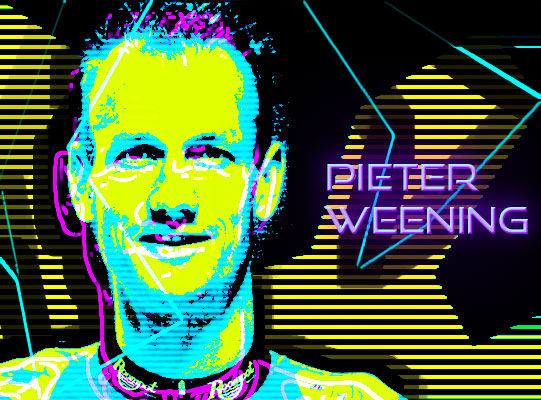Pieter Weening, Dutch pro and 39-year-old role model for us older millennials who still dream of a career in sports, has announced his retirement.
His palmares boasts 13 wins, including one Tour de France stage, two individual Giro d’Italia stages, two more TTT Giro stages, and victories in the Tour de Pologne and Tour of Norway.
Want to feel old? That stage of the Tour de France in which he beat Andreas Kloden by less than half a centimeter–the closest stage finish ever in the Tour–was over 15 years ago. Yep, in 2005. Yep, 2005 was 15 years ago. Not sure how that happened.
After a few years hidden away in the pro conti leagues, Weening returned to the top stage this year, joining Trek-Segafredo. He rode the Giro d’Italia, but didn’t finish it. Well, not many people did finish it this year.
He retires remembered as a fine professional, and he’s always been well respected in the peloton. He’ll be missed, but we’re sure he’ll be back behind the scenes. See you at a training camp somewhere down the line, Pieter.
Here’s what he had to say to us:
Pieter, if we have to find a single definition for you, it would be a solid professional. And you showed that until your final day of racing.
PW: Thank you. Yeah, I can say I’m happy about what I achieved. I always raced in great teams as well as in amazing groups of people. I think this was a key motivation for me. I always felt the push to be part of a team spirit, to pursue a common goal, and to do better every year to achieve this. For sure, without good people around me, it would have been hard to have such a long career. So, let me thank all the teams that allowed me to do what I loved and all the people who supported me in this important part of my life, making me grow as a man as well as an athlete.
If you had to mention one thing that, above all, that pushed you to be a pro-rider, what would it be?
PW: First of all, the love for the bike, which came before the passion for cycling. Second, the lifestyle: not ordinary, almost crazy, a bit gypsy, always with the suitcase in hand. Thanks to the competitive spirit, the life of a sportsman is made of adrenaline and healthy tension. At the same time, when you are at home, you enter a sort of Zen mood to recover and be ready for the next challenge. This is so different from the life of the vast majority of people, and this is what has fascinated me so much over the years.
Had the idea of continuing for another year crossed your mind?
PW: When I joined Trek-Segafredo in February, after talking with Luca Guercilena and Steven de Jongh, I told myself to see how the Giro would go and then make a decision. Because of Covid-19, my season only lasted three months, and the Corsa Rosa took on even more significance. In the Dolomites camp with the Giro group, I was very motivated about the challenge on the horizon, to support Vincenzo and the Team’s ambitions. But then came the hard disappointment. A stupid fall in Stage 4 – which still makes me angry when I think about it – left a heavy mark. The next day I had to withdraw from the race, and I went home with the after-effects of a concussion. I thought I would recover for the Vuelta a España, but the doctors imposed absolute rest. That is when, with my mind at ease, I understood that the time had come. It was not the body that told me to stop, but more the spirit.
Do you have any regrets?
PW: The fact that I didn’t have the opportunity to race the Giro as I would have liked made me disappointed, but I have no regrets. I carry with me a lot of good memories from cycling. The victory at the Tour in 2005 and those at the Giro in 2014 and 2011, with four days in Maglia Rosa, were the highest moments. But I recall with pleasure also the Giro team time trials in Belfast in 2014 and the one in 2015 with Orica, both stunning team performances. I have so many facts and memories for each year that make me feel lucky for this long adventure. Also, thanks to this, I am now ready and happy to look toward something else.
Will we see you hanging out in the cycling world?
PW: Hopefully, yes, I love this sport and this world, but not in the immediate future. For now, after almost 20 years on the road, I just want to rest and enjoy my life at home in Neerharen with my wife and our two kids. I have some thoughts and ideas for the future, but this is not the time to make any announcements.
From the top of your experience, how do you see today’s cycling?
PW: A lot has changed since I turned professional in 2004, especially in the last 10 years with the advent of a more scientifically-based approach. When I started, it was all about races, and the most important numbers to reach the top condition were the racing days. Now you spend more days in training and altitude camps, you follow a more specific schedule to prepare for the key moments. Modern cycling is a more controlled sport, with a continuous monitoring of data. Before, it was mostly based on feeling. Both approaches have their pros and cons, but there is no doubt that now we have a more advanced professional sport.
We are seeing more and more young riders turning professional. What advice would you give them?
PW: Don’t lose the desire to have fun with your bike. Being a pro rider now is pretty stressful. As in many aspects of our life, we have to deal with a lot of information and input: training schedules, numbers, supplements, diet, biomechanics, and equipment. And, at the top, the performance. It’s not easy to manage everything and, by experience, I can say you never get really used to all these things. So, young guys, take your time. First of all, enjoy the beauty of racing, feel the competition, and get stronger and confident through that, especially on the mental side. After a few years, you will know yourself better and the type of rider you are. This will be the moment you can focus on details.


